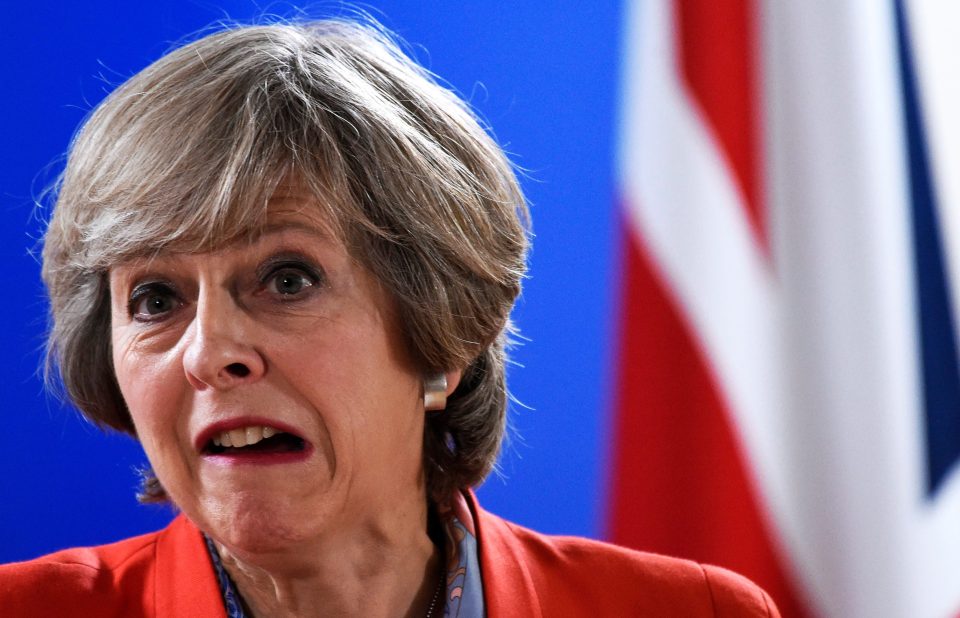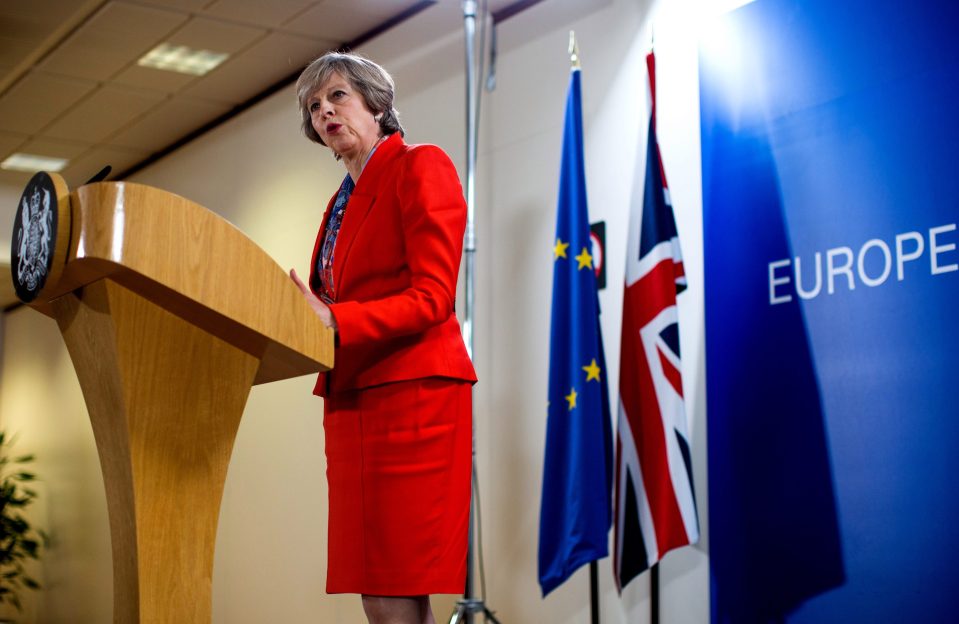Bombshell High Court ruling delays Brexit for ‘up to a year’ as top judges say Theresa May ‘does not have the power’ to trigger Article 50 leaving PM’s ‘EU plans in tatters’

BREXIT could be delayed for up to a year after three top judges defied Theresa May yesterday and tore up her plan for leaving the EU.
In a bombshell ruling at the High Court, a panel led by the Lord Chief Justice said the PM “does not have the power” to trigger Article 50 herself.
They instead ordered her to get permission from Parliament before she can formally start the process.
The verdict will spiral Mrs May’s stand-off with MPs and increases the chances of an early general election next year if not resolved.
And last night bookies Ladbrokes cut the odds of a general election being called next year from 4/1 to 2/1.
The Government said within minutes of the ruling that it would appeal to the Supreme Court, with an emergency hearing set for December 7 and 8.
But ministers have admitted that if that bid fails, they will have to pass a fresh Act of Parliament through the House of Commons and the Lords in order to begin Brexit, which could take 12 months.
It is also likely to allow rebel Tory MPs to join forces with Labour to dictate the precise shape of Brexit.
Yesterday’s judgment left most Leave campaigners seething.
They accused millionaire hedge fund manager Gina Miller, who brought the case to court, and her business backers of using the “fig leaf” of
democracy to reverse the EU Referendum decision.
But last night Mrs May stood defiant. Her official spokeswoman said: “We have no intention of letting this derail our timetable in getting on with triggering Article 50 in the time frame we have set out.
“What matters is doing what is in Britain’s national interest. That doesn’t mean setting out all your cards on the table as you go into negotiation with 27 other countries.”
Brexit Secretary David Davis insisted the Government does not need MPs’ permission because the 17.4million people who voted Leave in the Referendum had already given it “the biggest mandate in history”.
Mrs May was forced to cancel her plans for today to instead call other European leaders to reassure them she will begin Brexit talks by the end of March 2017.
THE LANDMARK LEGAL CASE MEANS
But pro-Leave campaigners urged her to call an election to bring in a new generation of Tory MPs to back her while she still enjoys a massive poll lead over Labour.
Ukip MP Douglas Carswell said it was “time to get a new Parliament”, as well as issuing a call for new judges to be appointed.
But No10 officials dampened talk of an early election for now, with the Prime Minister’s spokeswoman saying: “There should not be an election before 2020. This remains the PM’s view.”
The ruling caused a surge in the Pound yesterday, gaining 1.14 per cent in 30 minutes.
By last night, senior Labour and SNP MPs were threatening to vote down Brexit if the Government appeal fails.
Nicola Sturgeon said her 54 MPs “will not vote in any way that will undermine Scotland’s interests”.
Failed Labour leadership contender Owen Smith urged his party to push to “give the British people the final say” by staging a second referendum
RELATED STORIES:
And former PM Gordon Brown suggested there could be riots in the North if Britain does leave the EU.
He said post-Referendum optimism would be short-lived and claimed the UK could see “discontent turn to anger” as voters see their standards of living fall and jobs vanish.
Some prominent Leavers backed the court’s decision, saying it was the right thing for democracy.
Campaign boss Dominic Cummings called it “reasonable” and said the idea government should be able to change the law via royal prerogative was “foolish and dangerous”.
But Tory MP Dominic Rabb said: “This unholy and unelected alliance of fund managers, Lib Dem lords and diehard Remain campaigners are trying to reverse the democratic verdict in the referendum.
“I hope common sense prevails in the Supreme Court.”
The Brexit legal challenge: Who gets to trigger Article 50?
Here is all you need to know about the bombshell decision to give MPs a say before the process of leaving the EU begins:
What happens next?
The government has announced it will appeal, with the Supreme Court sitting in full for the first time since it was created in 2009.
This means at least nine justices, possibly 11, will pore over the case.
Those judges will under pressure to deliver a final decision possibly before the end of the year, with a provisional date in early December pencilled in.
Lawyers say it could conceivably be further appealed to the European Court of Justice, but that this is highly unlikely.
What will Theresa May be thinking after judges rule against the government?
The Prime Minister may not be in a position to trigger Article 50 by the end of March as planned. MPs will now have the choice to approve the bill, reject it or pass it with amendments.
The best case for the government would be to avoid primary legislation and involve parliament through a substantive motion — a proposal put forward for debate and a vote.
This would be a quicker process and could be done early next year. Legislation would take longer as it involves various stages of debate and approval.
The House of Commons is thought to be unlikely to try to stop Brexit, but a cross-party group of lawmakers, who support a “soft Brexit”, whereby Britain stays in or remains close to the EU single market, have demanded a greater say for parliament in negotiations and say they might try to pass amendments that guarantee this.
Who took the challenge to the High Court?
The lead claimant is investment fund manager Gina Miller with hairdresser Deir Tozetti Dos Santos, the second claimant.
Other interested parties involved in the case include “The People’s Challenge”, featuring an Englishman of Bangladeshi origin, an Irishman, two Scotsmen resident in France, a Welshman and a Gibraltarian, whose wife is Spanish; another group of British expatriates; and British children of EU nationals and non-EU carers of British children or the disabled.
What did they argue?
The claimants always argued the case is not about trying to either stop or delay Brexit.
They say that if this decision is taken by the government alone, Britons will lose these EU rights which have been incorporated into domestic law through acts parliament, without parliament having any involvement.
They believe that the referendum was only advisory and gave no indication on when and on what terms Britain should leave.
And because the Article 50 process is irreversible, they argue that issues such as the right to vote in European parliament elections and free movement of people should be a matter for parliament.
The model who derailed Brexit
Who is Gina Miller, the South American wife of a hedge fund boss who says vote to leave the EU made her ‘physically sick’?
A SOUTH American-born former model has derailed Brexit in court after claiming the referendum result made her "physically sick".
Jubilant remainers cheered Gina Miller, 51, on the steps of the High Court today as it was announced she had taken on Prime Minister Theresa May and won.
Some branded Mrs Miller "woman of the century" after the Government lost a bombshell High Court decision – meaning Parliament must get a vote BEFORE it triggers Article 50.
Laughing on the top step of London's High Court the financier's wife said: "You can't have a Government casually throwing away people's rights, that why we turned to the courts.
"It is about process not politics."
Earlier this year Mrs Miller explained her decision to pursue legal action to block Brexit saying: "I felt physically sick because I thought, I don't think people know the ramifications of this, of what's happened, and I felt really sorry that people had been tricked and fooled."
The mum-of-three, born in Guyana and raised in Britain, is a successful investment manager and philanthropist.
She has worked for companies including BMW, Legal & General and Scottish Widows.
The former model met her husband while working for investment firm New Star.
She now works for SCM Private, the firm she co-founded in 2014, and runs her own True and Fair Foundation, which advises charities on taking a business-like approach to their work and encourages people to "give smarter" to good causes.
LAW LORD'S EURO BODY
THE top judge who handed down the Brexit ruling set up a Euro law organisation.
The European Law Institute, founded by Lord Chief Justice John Thomas, 69, works for “legal integration” in Europe. Two other judges were involved in the ruling — Labour’s ex-chief lawyer Lord Justice Philip Sales, 54, and Sir Terence Etherton, 65, the first openly gay judge.

























